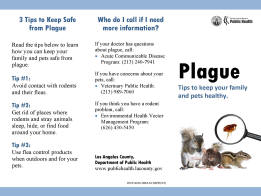Plague
NOTE TO ALL HEALTHCARE PROFESSIONALS:
If you suspect that a patient is infected with plague, immediately call Acute Communicable
Disease Control to assist with diagnosis and implementation of infection control.
(213) 240-7941 (7:30AM-5:00PM, Mon-Fri)
(213) 974-1234 (After Hours, Emergency Operator)
Plague, also referred to as bubonic plague, is a disease caused by the bacteria
Yersinia pestis, which is spread by fleas and rodents to human beings. Historically,
plague has reached epidemic and even pandemic proportions in Asia and Europe. It is primarily
a disease of rodents such as rats, prairie dogs, chipmunks, squirrels and other similar
rodents. Human infection occurs when a person is bitten by infected fleas. However, the
disease in humans is rare. An estimated 10 to 20 Americans contract plague each year,
mostly in rural communities. About one in seven cases results in death.
Human cases of plague are rare in Los Angeles County. Plague is commonly found in ground
squirrels around Tehachapi, Lake Isabella, Frazier Park, and in the Angeles National
Forest between Los Angeles and Antelope Valley. Campers, hikers and residents in those
areas can protect themselves against the disease mainly by avoiding ground squirrels and
their fleas.
Special Studies Report (2015)
Resources
Publications & Archives

